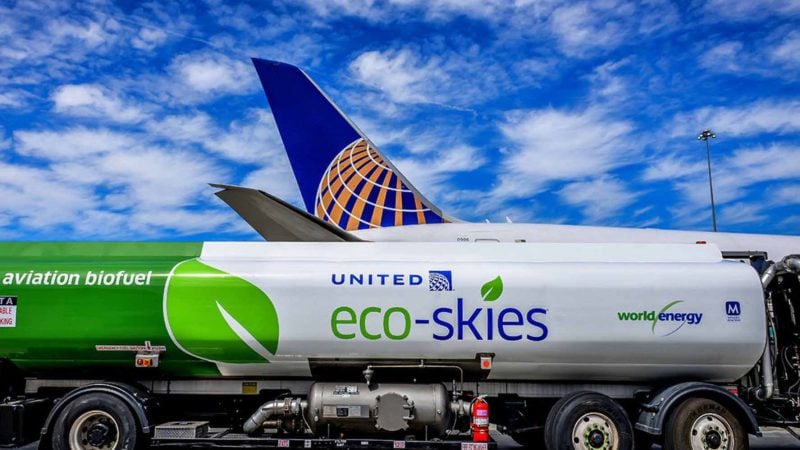United Airlines Leading Charge for Carbon-Free Future
UAL is investing heavily in biofuel and planet-friendly practices as the only US airline to do so
June 18, 2019

As airline manufacturers scramble to come out with the new concepts in carbon-free aviation technology, United Airlines threw its hat into the ring this month with the “Flight for the Planet” between Chicago O’Hare and Los Angeles LAX. Through that effort, United became the first known airline to demonstrate all of the following key actions on a single commercial flight: utilization of sustainable aviation biofuel; zero cabin waste efforts; carbon offsetting; and operational efficiencies.
United is using the Flight for the Planet campaign to evaluate the sustainability factors in key measures of flying using the airline’s current technology, resources and fuel-saving procedures. The flight departed from gate B12 at United’s hometown hub of Chicago O’Hare for its “eco-hub” in Los Angeles on June 5th. Sustainable aviation biofuel has helped power all the airline’s flights from the Southern California hub since 2016. The airline has been using is a blend of 70 percent traditional jet fuel and 30 percent biofuel, so it doesn’t require any modifications to aircraft engines or airport infrastructure. The 30/70 low-carbon blend is supplied by Boston-based World Energy, and traditional jet fuel. The biofuel alone achieves a greater than 60% reduction in greenhouse gas emissions on a lifecycle basis compared to traditional jet fuel, and using biofuel is one of the most effective ways an airline can reduce its impact on the environment.
The Flight for the Planet further illustrates United’s commitment to reduce its carbon footprint by 50% by 2050. The airline has agreed to purchase up to 10 million gallons of cost-competitive, sustainable aviation biofuel over the next two years and, in doing so, has marked itself as the first airline globally to use sustainable aviation biofuel on a continuous basis and the only airline in the United States to currently do so.
Zero Carbon in the Cabin
In the Economy cabin, United is swapping traditional snack options with a complimentary plated service featuring fully recyclable or compostable serviceware, including a test of an industry-first, recyclable-paper, hot beverage cup.
In the premium cabin, United is continuing to use reusable service ware and swap plastic lids for beeswax food wrappers. The airline is also removing the paper wrapping from silverware roll-ups. United has already eliminated non-recyclable stirring sticks and cocktail picks on aircraft systemwide and replaced them with an environmentally-friendly product made of 100% bamboo.
Carbon Offsetting
United is offsetting the remainder of the flight’s emissions via the airline’s new carbon offset provider, Conservation International. Conservation International now partners with United on the airline’s consumer carbon offset program – Eco-Skies CarbonChoice – and together the two allies will focus on CI’s mission to promote nature-based solutions to climate change.
Operational Efficiencies
United has made significant investments in a modern, fuel-efficient fleet while implementing operational and procedural changes to drive fuel conservation. The Flight for the Planet is demonstrating single-engine taxiing, Air Traffic Control prioritization and a continuous descent approach into Los Angeles, which saves fuel while also reducing noise impact to the city. United is operating the flight using its Eco-Skies livery Boeing 737-900ER, which on average carries passengers 77 miles on a single gallon of fuel.
In addition, 40% of United’s eligible ground service equipment (GSE) is electric-powered, with more than 70% of the airline’s ground operation at its Los Angeles eco-hub utilizing electric GSE equipment to reduce workplace noise pollution and cut carbon emissions by 90%.
Environmental Firsts in Aviation
• Globally, United is the first to use sustainable aviation biofuel on a continuous basis, marking a significant milestone in the industry by moving beyond test programs and demonstrations to the everyday use of low-carbon fuel in ongoing operations.
• Investing more than $30 million in California-based sustainable aviation fuels producer Fulcrum BioEnergy, which remains the single largest investment by any airline globally in sustainable fuels. United’s agreement to purchase nearly 1 billion gallons from Fulcrum BioEnergy is the largest offtake agreement for biofuel in the airline industry.
•Becoming the first airline to fly with Boeing’s Split Scimitar winglets, which reduce fuel consumption by an additional 2 percent versus standard winglets; United is the largest Scimitar winglet operator today, with nearly 400 aircraft equipped with these winglets.
• Becoming the first U.S. airline to repurpose items from the carrier’s international premium cabin amenity kits.
• Partnering with Audubon International to protect raptors – including hawks, owls and kestrels – in and around United’s hubs and resettle the birds of prey at habitats where the species are more likely to thrive.
“Investing in sustainable aviation biofuel is one of the most effective measures a commercial airline can take to reduce its impact on the environment,” United’s president, Scott Kirby, said in a statement. “As leaders in this space, United and World Energy are setting an example for the industry on how innovators can work together to bring our customers, colleagues and communities toward a more sustainable future.”




